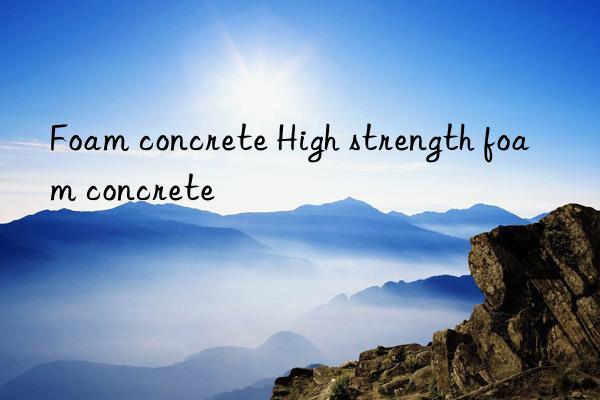
Foam concrete is a lightweight and high-strength cement-based thermal insulation material. The basic principle is to use a large number of closed pores in concrete to achieve lightweight, thermal insulation, and thermal insulation effects. Foam concrete is a new type of lightweight porous thermal insulation and energy-saving material that is made by mixing foam agent and cement or adding aggregates such as fly ash, sand and gravel, slag, etc., mixed, stirred, poured and formed, and then naturally cured.
Application scope of foam concrete
Roof thermal insulation, including insulation layer and slope layer.
Frame structure non-load-bearing wall, block.
Floor floor heating or sound insulation cushion.
Filling of foundation pits in basements, bridges, tunnels, etc., as well as retaining walls for slope protection, river banks, and ports.
Insulation of industrial pipes, cast-in-place insulation of refractory furnaces, lightweight rockeries, bonsai, etc.
Performance characteristics of foam concrete
1. Lightweight and high strength
The density of foam concrete is small, and the density grade of commonly used foam concrete is 300-1200kg/m3. It is equivalent to 1/5~1/10 of ordinary concrete. The compressive strength is greater than 0.25Mpa. Foam concrete products with different bulk density and strength can be produced according to the building design requirements. The use of this material in the internal and external walls, roofs, exposed surfaces, columns and other building structures of buildings can significantly reduce the weight of the building and improve the load-bearing capacity of the building.
2. Thermal insulation
Since foam concrete contains a large number of small closed bubbles, it has good thermal performance. Foam concrete with a density range of 300-1200kg/m3 has a thermal conductivity between 0.06-0.3W/(m.k). Foam concrete is used as building wall and roof materials, which has good thermal insulation and energy-saving effects.
3. Good sound insulation performance
Foam concrete is a porous material with a sound absorption capacity of 0.09-0.19%. It has good sound insulation performance and can be used as sound insulation boards on building floors, highways, and top floors of underground buildings. This material can be used as a sound insulation layer in other fields.
4. Safety, fireproof, and good durability
The foam concrete is firmly bonded to the base of the building, does not hollow out, does not crack, is resistant to pressure and wind, is impact resistant, and has good durability. . Foam concrete is an inorganic and non-combustible material. Whether it is used for roof insulation, floor heating, or indoor cushioning, there is no need to worry about fire protection. Foam concrete is a cement product, and its lifespan is basically the same as the life of the main body of the building.
5. Cost saving and fast construction
Foam concrete is a cement product. During on-site construction, it is produced with special foam concrete production equipment, pumped, and poured directly on the construction surface. Save labor and time. Foam concrete production equipment is used to produce concrete blocks, new energy-saving bricks and other predictive parts. The cost is low and the production speed is fast. One production line can meet the large-volume market demand.
</p

 微信扫一扫打赏
微信扫一扫打赏

